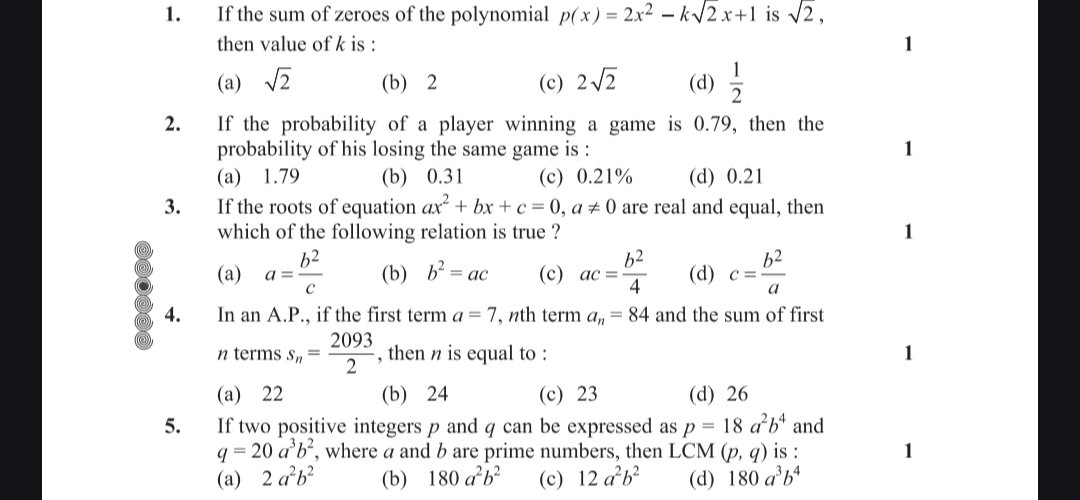1. If the sum of zeroes of the polynomial p(x) = 2x² - k√2x + 1 is √2, then value of k is: (a) √2 (b) 2 (c) 2√2 (d) 1/2 2. If the probability of a player winning a game is 0.7... 1. If the sum of zeroes of the polynomial p(x) = 2x² - k√2x + 1 is √2, then value of k is: (a) √2 (b) 2 (c) 2√2 (d) 1/2 2. If the probability of a player winning a game is 0.79, then the probability of his losing the same game is: (a) 1.79 (b) 0.31 (c) 0.21% (d) 0.21 3. If the roots of equation ax² + bx + c = 0, a≠0 are real and equal, then which of the following relation is true? (a) a = b²/c (b) b² = ac (c) ac = b²/4 (d) c = b²/a 4. In an A.P., if the first term a = 7, nth term a_n = 84 and the sum of first n terms S_n = 2093/2, then n is equal to: (a) 22 (b) 24 (c) 23 (d) 26 5. If two positive integers p and q can be expressed as p = 18a²b⁴ and q = 20a³b², where a and b are prime numbers, then LCM(p, q) is: (a) 20a³b² (b) 180a²b² (c) 12a²b² (d) 180a³b⁴

Understand the Problem
The question set contains a series of mathematical problems that require solving for values related to polynomials, probabilities, equations, sequences, and integers. Each question needs to be understood in its own context to find the correct answers.
Answer
1. \( k = 2 \) 2. \( 0.21 \) 3. \( b^2 = ac \) 4. \( 24 \) 5. \( 180a^3b^4 \)
Answer for screen readers
-
( k = 2 )
-
Probability of losing = ( 0.21 )
-
( b^2 = ac )
-
( n = 24 )
-
LCM of ( p ) and ( q = 180a^3b^4 )
Steps to Solve
- Sum of Zeroes of the Polynomial
The sum of the zeroes of the polynomial ( p(x) = 2x^2 - k\sqrt{2}x + 1 ) can be found using Vieta's formulas, which states that for a polynomial of the form ( ax^2 + bx + c ), the sum of the roots is given by ( -\frac{b}{a} ). Here, ( a = 2 ), ( b = -k\sqrt{2} ). Thus, the sum of the zeroes is: $$ -\frac{-k\sqrt{2}}{2} = \frac{k\sqrt{2}}{2} $$
Setting this equal to ( \sqrt{2} ): $$ \frac{k\sqrt{2}}{2} = \sqrt{2} $$ Multiplying both sides by 2: $$ k\sqrt{2} = 2\sqrt{2} $$ Dividing both sides by ( \sqrt{2} ): $$ k = 2 $$
- Probability of Losing
If the probability of winning is 0.79, then the probability of losing can be calculated as: $$ \text{Probability of losing} = 1 - \text{Probability of winning} $$ Substituting in the value: $$ \text{Probability of losing} = 1 - 0.79 = 0.21 $$
- Roots of the Quadratic Equation
For the quadratic equation ( ax^2 + bx + c = 0 ) with equal real roots, the discriminant ( b^2 - 4ac = 0 ). We can use this to find the required relationship: Thus, using this relation: $$ b^2 = 4ac $$ This corresponds to option (c).
- Finding ( n ) in A.P.
Given the first term ( a = 7 ), the nth term ( a_n = 84 ), and the sum of the first ( n ) terms: Using the formula for the nth term of an A.P., where ( a_n = a + (n - 1)d ), we can deduce: $$ 84 = 7 + (n - 1)d $$ Thus: $$ (n - 1)d = 84 - 7 = 77 $$
The formula for the sum of the first ( n ) terms is: $$ S_n = \frac{n}{2}(2a + (n - 1)d) $$ Setting ( S_n = \frac{2093}{2} ): $$ \frac{n}{2}(14 + (n-1)d) = \frac{2093}{2} $$ Multiplying both sides by 2: $$ n(14 + (n - 1)d) = 2093 $$ This can be simplified and solved for ( n ) upon substitution of ( d ).
- Finding LCM of ( p ) and ( q )
Given ( p = 18a^2b^4 ) and ( q = 20a^3b^2 ), we find the LCM using each prime factor's highest power: The prime factorization is:
- ( p = 2^1 \cdot 3^2 \cdot 5^1 \cdot a^2 \cdot b^4 )
- ( q = 2^2 \cdot 5^1 \cdot a^3 \cdot b^2 )
Thus, the LCM is: $$ LCM(p, q) = 2^{\max(1, 2)} \cdot 3^{\max(2, 0)} \cdot 5^{\max(1, 1)} \cdot a^{\max(2, 3)} \cdot b^{\max(4, 2)} $$ Which simplifies to: $$ LCM(p, q) = 2^2 \cdot 3^2 \cdot 5^1 \cdot a^3 \cdot b^4 = 180a^3b^4 $$
-
( k = 2 )
-
Probability of losing = ( 0.21 )
-
( b^2 = ac )
-
( n = 24 )
-
LCM of ( p ) and ( q = 180a^3b^4 )
More Information
- The sum of the zeroes in a quadratic polynomial provides insight into the relationship between the coefficients.
- Understanding probabilities is crucial in games and statistics.
- The discriminant of a quadratic equation determines the nature of the roots.
- The arithmetic progression formula helps in solving sequence problems.
- LCM calculations are vital in number theory and fractions.
Tips
- Confusing the sum of zeroes with the product of zeroes in polynomial problems.
- Miscalculating probabilities by neglecting the total probability must equal 1.
- Failing to simplify equations properly in algebraic expressions, particularly in sequences.
- Mistakes in prime factorization can lead to incorrect LCM results.
AI-generated content may contain errors. Please verify critical information